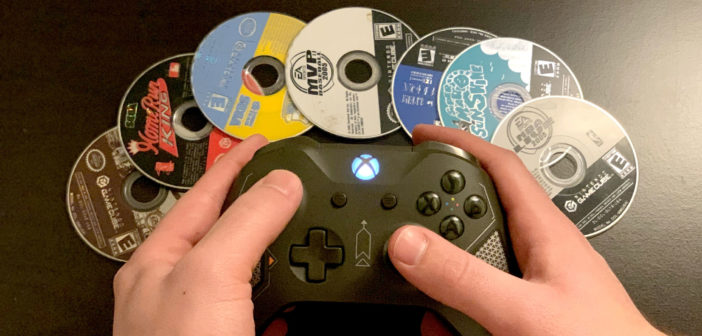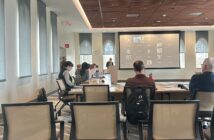With one click of the Nintendo Wii remote, Rachel Lehner, ‘20, is inside the world of “Ōkami,” where Amaterasu — a bold, white wolf with a flaming halo — sits on a cliff’s edge and howls into the moonlight.
Playing as the sun goddess in wolf form, Lehner has free reign in this world, interacting with strange characters and tackling a series of quests and missions to rid Japan of the demons that plague the land. But the journey doesn’t come easily, as Amaterasu must fight the eight-headed serpent Orochi and other monsters throughout the story.
When she first booted up “Ōkami” on her Wii system in middle school, Lehner was entranced by the game’s minimalist beauty and calming soundtrack. She became Amaterasu, bustling through the tall grass fields, unsure of where to head, but excited to engulf herself in a new universe.
The Japanese brushwork and background music pulled Lehner into the game, but the intricacies and mythological undertones of the plot drag her back time and again. It was “Ōkami” that sparked her curiosity in game design, and she hopes to one day create something with paralleled magnificence.
Lehigh’s Game Design Club is one way she can achieve this goal.
The video game design club functions as an outlet for students to both learn how to design video games and bounce ideas off one another to advance their personal endeavors in computer programming.
Gencer Ates, ’19, is the president of the group and majors in industrial engineering. He said the club’s purpose is to provide a space where people can explore the world of game design and ask questions along the way.
Ates has dabbled in game design since he took a summer course at Worcester Polytechnic Institute that covered the basics and inspired him to create video games himself. He founded the club at Lehigh in 2018 to pay it forward to students who also love the virtual realm.
“This is not a team,” he said. “This is a club where we provide the time and resources (for students). It’s your game — if you’re interested and like design work, you can work with other members, but it’s not about one specific game or one specific person.”
The club meets twice a week. One session is designated for brainstorming and learning design concepts, and the other is a workshop day in which club members can play around with the software while Ates roams the room and assists where he can.
Lehner studies computer science at Lehigh and serves as Game Design Club’s secretary.
“I’ve always been interested in how things work, which is kind of why I’m in computer science,” she said. “I like to think I have lots of ideas, so once I have the tools, I can actually start making things.”
The club uses Unreal Engine 4, a design software that boasts a simplistic interface and allows users to see an image of what they’re creating right next to where they input instructions.
Ates said Unreal’s design software is easy to pick up.
“It’s a painting which you can interact with,” Ates said. “You have an idea in your mind, and you can see where it’s going.”
However, Lehner struggles with the engine because her experience with Unreal is fresh. She said game design is different from anything else she’s done with computer programming because it focuses on visualizing rather than inputting lines of code. Still, she’s confident that she’ll be able to comfortably operate it by the semester’s end.
“I’m excited to get more familiar with Unreal Engine,” she said. “Once you understand the platform that you’re using, then you can basically do whatever you want.”
Sept. 4, 2019, was the club’s inaugural meeting. Ates facilitated an open conversation where members were encouraged to spit out any game mechanics they could imagine to develop into an eventual video game. The list contained items like “users can fly,” “monsters and people” and “customizable weapons.”
Faculty adviser Hector Munoz-Avila is a computer science professor. In his introduction at the meeting, he emphasized his passion for all things game design and artificial intelligence. He admired the brainstorming session that Ates led, but noted that game design is a complex topic, and the elements that were discussed will evolve drastically over time.
That said, Munoz-Avila tries to avoid interfering with the club’s workflow.
“Students leading the club and deciding for themselves how to proceed is a fundamental part of their experience,” he said.
About halfway through the exercise, Ates suggested that the game should be a “looter-shooter,” based on the ideas that members offered.
Most games played on PC computers are either first-person shooters or role-playing games. First-person shooter games feature weapon-based combat where the user controls one player in a map, and the screen displays that map through the protagonist’s perspective. Role-playing games allow players to control a fictional character who is on a quest, like Amaterasu in “Ōkami.” A looter-shooter is a combination of these two genres of games.
Munoz-Avila hopes the members learn a great deal throughout the semester and work toward a collective goal.
“Ideally, I will expect that they have a full game, but the experience of going through the process is very valuable,” he said.
Lehner and Ates both said they wish for students to develop a passion for game design by means of the club and translate that into an interest in computer science.
However, they each have personal goals for the semester, too. Ates is considering pursuing a master’s degree in game design after he graduates and said leading this club is a solid stepping stone.
Lehner is chasing a hobby and enjoys the chance to escape the real world, which video games offer her.
“The world just sucks — I have homework and bills,” she said. “In video games, I don’t have that. It’s like, ‘I’m gonna be someone else for a little bit. I’m gonna go on a magical adventure where I’m special.’”






Comment policy
Comments posted to The Brown and White website are reviewed by a moderator before being approved. Incendiary speech or harassing language, including comments targeted at individuals, may be deemed unacceptable and not published. Spam and other soliciting will also be declined.
The Brown and White also reserves the right to not publish entirely anonymous comments.